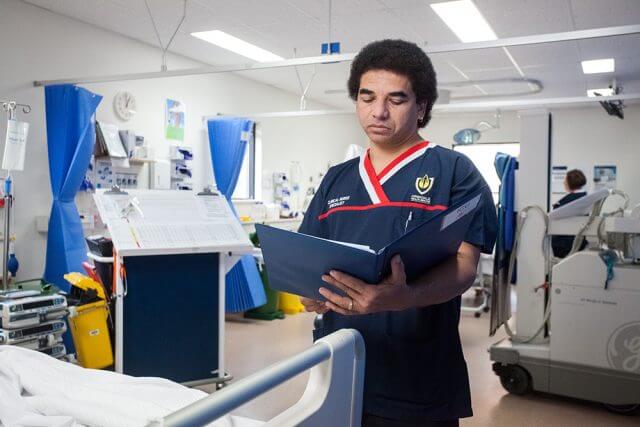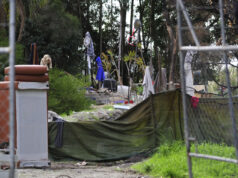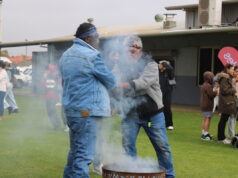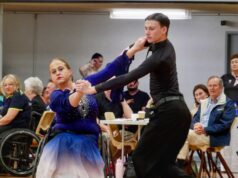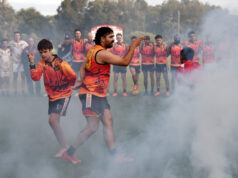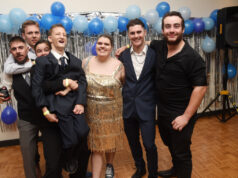With nurses across the world marking international nurses day on May 12, clinical nurse specialist Denver Prince gives editor Robyn Molloy an insight into the intensive care unit at the Armadale Kelmscott memorial hospital.
Denver Prince was instrumental in setting up the 10-bed intensive care unit (ICU) at Armadale Kelmscott memorial hospital (AKMH) in 2010, seeing it through from a storage area to an ICU.
Operating for five years the ICU admits 500 to 600 patients per year who previously had to transfer to city hospitals including mothers of newborns.
“It is the place where we look after the sickest of the sick,” Mr Prince said.
“Armadale is unique, before Fiona Stanley came on line this was the only hospital that had an ICU department and a maternity department, a massive one, we had more than 2200 births a year and with that comes complications.
“What would happen in the past was if the baby was well the baby would remain here but if the mother had a medical condition that required intensive care or higher level support the mother would be transferred.
“And the father would travel all over the shop.”
Mr Prince said his ICU team strived to provide the best care they could despite the ill health of those admitted.
“For me on the one hand it is looking after the community, trying to get them better but I also realise there are times in the ICU regardless of what we are able to do we are not going to change the outcome and this person may die,” he said.
“And when we get to that point it is about making sure the death is as comfortable and as dignified as it can be.
“At that point the focus would somewhat shift to loved ones and families and making sure they are supported.
“The patient at that time, we can do things to make them comfortable and it is not treatment anymore, we are not sticking needles and tubes and lines to try and save the life.
“We recognise that the injury or illness is so catastrophic that regardless of what we do we cannot change it.
“It is about being honest and upfront with the families and letting them know we have tried but we can’t do anything.”
Mr Denver said death was never easy for a nurse to deal with.
“Sometimes it appears that it gets easier with time, I mean I have been doing this for 28 years and I have seen lots of people die in lots of different ways, lots of different histories and backgrounds but it doesn’t get easy,” he said.
“You have to think at that point in time you have a traumatised and distressed family and you still need to be professional and you need to treat the patient that is dying with dignity and the family with respect.
“The important thing for nurses afterwards is to debrief.
“There are some cases that hit you more than others and for most of us that would be children because those are always hard to deal with.
“Our ICU generally does not take children but it doesn’t mean we don’t see the young because we see a lot of people aged 18 to 22.
“It is hard for nurses every time.
“When somebody is dying we try to give the family a quiet room and we ask staff to put a tea trolley in there, it is the small things we do to ease the traumatic time.”
Mr Prince said when patients responded to treatment, it was the greatest reward of all to see them functioning again in a meaningful way.
“Seeing somebody at their worst, at the sickest point they are ever likely to be, you see them where they have no idea where they are, who they are, they cannot breathe for themselves,” he said.
“Sometimes they have been in a coma for weeks, they are scared, they don’t know where they are, the last thing they remember might be a month ago.
“The best part for me is when they are waving to me and they are going out of the unit.
“And the cherry on top is when they come in a month later, they are walking up and down the stairs and they say thank you.
“It is not so much the thank you, it is the seeing them again.
“We more or less always remember what they looked like when they first came in and all the things we needed to do to save their life.
“Some of the nurses live in the area, they see them around the shops so just the knowledge that they are out and about, that is the reward.
“I’m really proud of my team, we have excellent outcomes for our patients and we work very well together, that goes for everyone who works in the unit.”
Finalist in excellence awards
Denver Prince was a finalist in the WA nursing and midwifery excellence awards in the excellence in leadership category, nominated for his emphasis on staff development.
He brings international experience to the ICU team having trained in South Africa and a five-year stint in New Zealand before coming to Royal Perth hospital ICU from 2003 to 2010.
He moved to Armadale Kelmscott memorial hospital from May 2010 to help develop the hospital’s ICU, which opened in August 2010.


